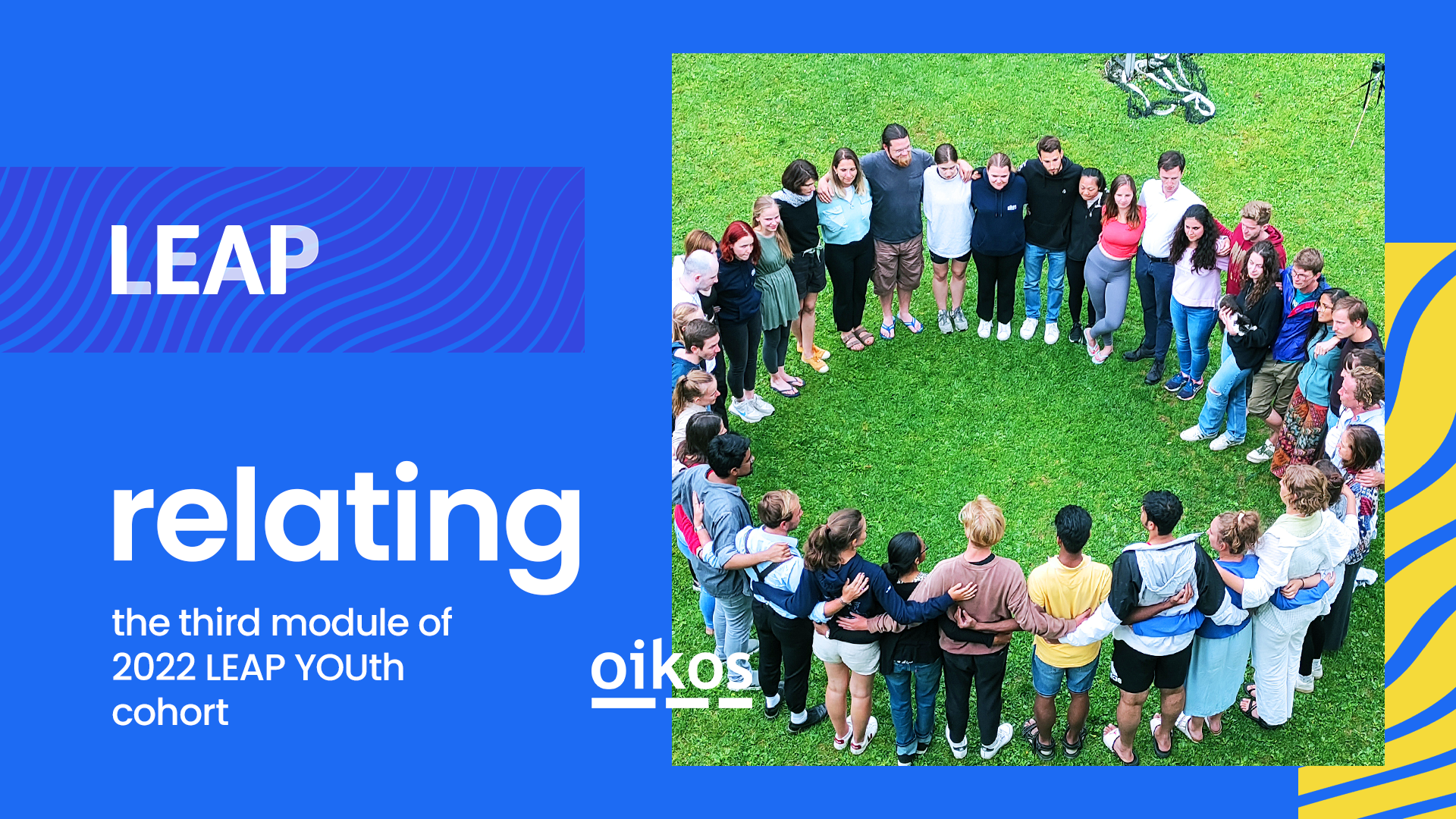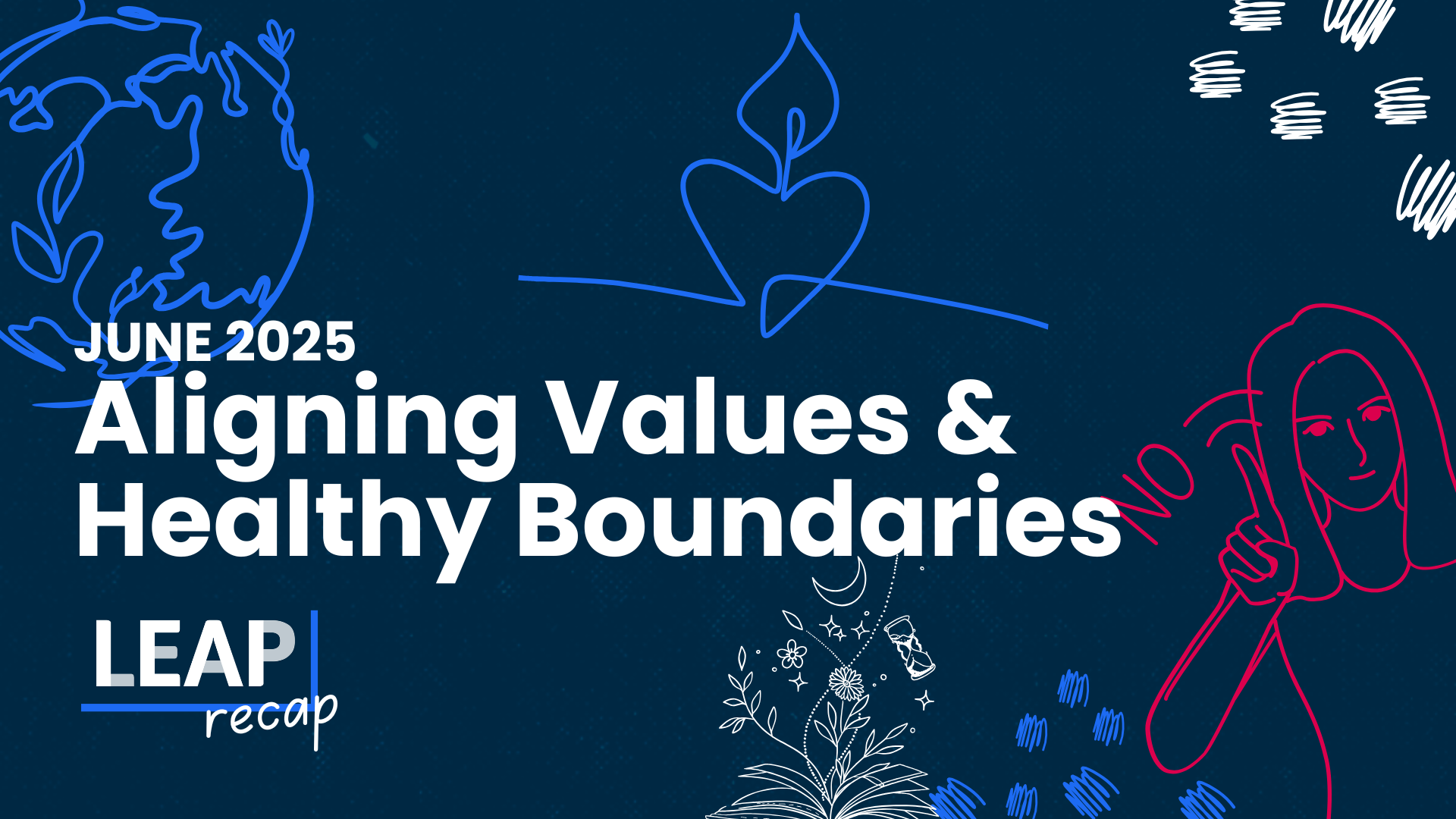
During the 10-month journey, participants at LEAP YOUth experience the Inner Development Goals framework in 5 modules to explore the main dimensions of conscious leadership: Being – Relationship to Self; Thinking – Cognitive Skills; Relating – Caring for others and the world; Collaborating – social skills and Acting – driving change. Besides input webinars and workshops, they are supported by 1-1 coaching sessions, peer groups, are invited to engage in personal reflections and can enjoy 2 main onsite meetings.
Continuing our LEAP journey, from July to August participants went through the RELATING MODULE – caring for others and the world. In this module they explored how to relate from a sense of appreciation, humility, connectedness and empathy.
During these 2 months they developed interpersonal skills learning tools and/or frameworks that would offer reflection and inspiration to how to relate to self-others-nature with fundamental qualities and caring.

The first webinar was held by David Sibbet, with the focus on fostering relational intelligence with The Four Flows Model. The model provided an archetypal way of thinking about the four ways we humans relate to things – through awareness/attention; energy/emotions; information/identity/map and through matter/mechanisms/operations.
In ancient times these levels might have been called “spirit,” “soul,” “mind,” and “body.” These flows also resonate with what Carl Jung called intuition, feeling, thinking, and sensing. To fully engage with the model, participants connected those 4 levels to the 4 skills of the Relating model and learned different mindfulness practices for embodying relatedness.
For the RELATING workshop, our host was Dr. Stephan Harding, cofounder of the Schumacher College (England), senior lecturer in holistic science and pioneering earth scientist with a focus the theory of Gaia. Harding introduced the cohort to the concept of Deep Ecology, based on the work of professor Arne Naess, weaving the concept by building on the four-fold way of knowing mapped out by C.G. Jung (thinking, sensing, feeling, intuiting) and used by Sibbet in the previous webinar. Harding reinforced that ecological science is mainly concerned with facts and logic, and alone cannot answer ethical questions about how we should live in harmony with people and planet. He explained that for this we need ecological wisdom, adding the word deep to ecology to consider values and philosophy, what Naess call an ecosophy: an evolving but consistent philosophy of being, thinking and acting in the world, that embodies ecological wisdom and harmony.
Harding engaged participants in a deep conversation exploring the topic and its main proposal: that to relate in a deeper way to self-other-nature we need to develop deep experience, deep questioning and deep commitment. He explained that through living deep experiences in our relations we develop a strong sense of wide identification with what we are sensing and this helps us developing wide identification in which the sense of self is no longer limited by the personal ego, but instead encompasses greater and greater wholes. This identification involves a heightened sense of empathy and an expansion of our concern with the non-human life. We realise how dependent we are on the wellbeing of nature for our own physical and psychological well-being. As a consequence there arises a natural inclination to care and protect all life. The new sense of belonging to an intelligent universe revealed by deep experience often leads to deep questioning, which helps to elaborate a coherent framework for elucidating fundamental beliefs, and for translating these beliefs into deep commitment to different decisions in how we want to relate, how to pursue a more sustainable lifestyle and to take action for a more harmonious relation self-others-nature.
Some thoughts of participants during this module were:
“Thanks to this module I was reminded that deep thinking, deep sensing, deep feeling and deep intuition have always gifted me with deep connections to people and progress in life. Even though I already used to be an active listener and valuing relating with presence this module also showed me how to further develop these skills both theoretically as well as practically”. – Max, participant
“The deep sense of gratitude and connectedness I experienced during the midterm meeting was a precious gift and I have understood that learning is a fruitful process and how constant awareness towards all IDGs promotes growth in long run if not right away” – Soundarya, participant
“I think this module is very important because it includes other people and everything around us. They are a big part of our lives and it is important to learn how to approach them. The most important things I learned are practices for embodying relatedness” – Marija, participant
I discovered it is important to have more personal practices to connect with myself and nature. We have to talk about it and practice that more.” – Ana Karen, participant
“LEAP has been a transformative experience, don’t stop it”. – Bhargav, participant



